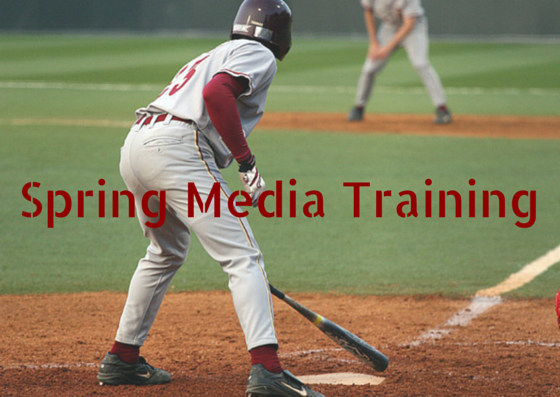Tips from the Dugout: How to Handle the Curveballs

Posted By Marian Hughes on April 03, 2015
Get in the Zone
A helpful trick to getting an interview off on the right foot is to walk into the discussion with a helpful attitude regardless of what your day has been like. We all have bad days, but an experienced spokesperson can step back, take a deep breath, and press reset on their day before heading into an interview.
It's important to remember that reporters have bad days, too. Stay calm, don't let yourself get defensive, impatient or take things personally. Work to understand what it is the reporter is looking to achieve and play whatever role you can in helping them achieve that. Even if you don't agree with the premise of a reporter's story, if handled correctly, the reporter will appreciate your ability to provide a useful counterpoint.
If the interview is going to be conducted by phone, seek out a quiet place free of distractions to have the discussion so you can be focused and provide thoughtful responses. If you are on the road, specifying that you'd like to call the reporter, vs the reporter calling you, helps ensure you are in the proper environment before the discussion begins. Dropped calls from a taxi are a recipe for broken thought processes and miscommunication.
Be a Team Player
Remember, this media interview can serve as the foundation to build an ongoing relationship with the reporter and his/her publication. And, relationships are built on communication. In the spirit of creating a healthy dialogue, the reporter may disagree with you. Be respectful of the reporter's job to fairly cover a story from all sides. If he or she asks questions that explore a contrarian point of view, remember that's his/her job. Keep your emotions in check and use it as an opportunity to educate and inform. In these situations, don't let the discussion turn into an argument. Appreciate the reporter's perspective, and be comfortable you may have to agree to disagree.
There are times, however, when a reporter may be working with inaccurate information. His job is to collect information from a variety of sources, and it's not uncommon nor can we blame them for getting things jumbled along the way. Find ways to politely correct gross inaccuracies, back your statement up with proof, and continue to communicate in the spirit of educating and informing.
Anticipate the Curveball
Prior to each interview, think about the tough questions the reporter may ask and practice your response so you are prepared to answer in a clear and helpful fashion. At the time, the media may ask you a question for which you don't have the answer. That's completely ok. Don't speculate on the answer, or even worse, make up a response rather tell them you'll get back to them with the accurate information as quickly as possible. However, if you are conducting a live broadcast interview, you won't have this luxury. In those situations, the best way to respond is to say, "I don't have an answer for that questions, but what I can tell you is..." and provide a useful piece of new information relevant to the topic at hand.
In some cases, you will have the answer to a reporter's question, you just need some time to formulate your thoughts. In those situations, don't rush. Using phrases like "That's a good question..." or "Before I answer, let me provide some background..." is helpful to give you the necessary time to craft the best answer.
Because a reporter is often times trying to cover a lot of ground in a limited amount of time, it is only natural that an interview can sometimes stray from the topic at hand. Be mindful of this, and gently bring the conversation back to its original focus if necessary.
At times you may be asked a question that you are not at liberty to answer because of corporate policies. In these cases, the pat "no comment" answer is often a wrong number, since it can leave the impression that you or your organization have something to hide. Instead, try to answer as much of the question as you are comfortable with and if necessary, explain why you aren't at liberty to say more. Continue to find ways to educate and inform without revealing proprietary information. If a question is vague, ask the reporter for further clarification before jumping into a response.
Keep Your Eye on the Ball
Finally, no matter how close you become with a reporter personally, always remember they have a job to do and you should be mindful of not putting yourself or them in a difficult situation with information you'd rather they not use. So, if you don't want to see something in print, don't say it. You should use the same caution in casual one-on-one conversations as you would in a formal interview. What you say to the media is always on the record.
So now that you've taken the time to brush up on your media training skills, here are some tips to continue to evaluate yourself and refine your skills throughout the year. After each completed media interview ask yourself:
- Were you able to communicate your three most important points?
- What were the most challenging questions that were asked? Are you comfortable with your responses? Would you change your response for future media interviews?
- If you could do the interview over, what would you do differently?
Practice does make perfect. Taking the time to continue to practice and evaluate yourself after each interview is an all star habit that will reap rewards for you as a spokesperson and trusted media resource.

Marian Hughes
Marian Hughes is a Co-founder and Managing Partner at Tier One, where she leads the agency's Chicago office. With more than 30 years of agency experience, Marian has helped shape communications programs for innovative technology brands since the 1990s dot-com boom. Her greatest love is building and leading agile teams that delight clients with creative programming and breakthrough results. When she is not working, Marian enjoys nature and the outdoors — whether through hiking, gardening, or on the pickleball court.


